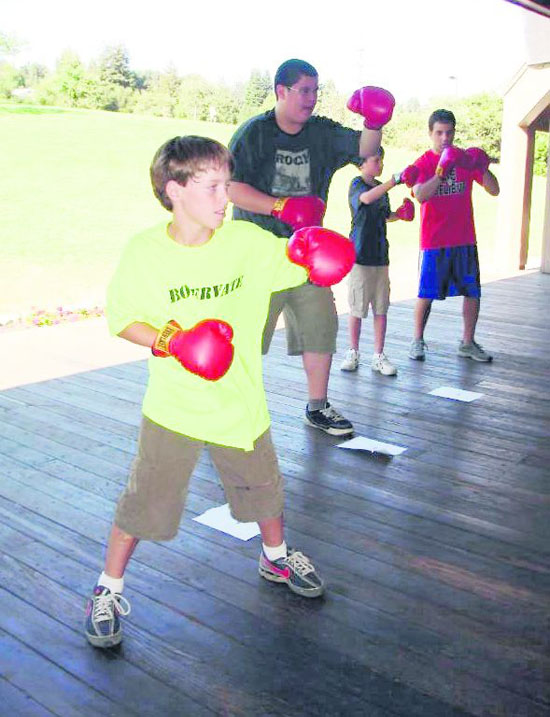| | Published September 3, 2008
| Parents Seek Inclusive After-School Programs for Kids with Special Needs
| | By Jennifer Wake |  | | MP Fitness for Life students practice unique fitness technique at
Moraga Commons Photo Andrew Verducci |
After-school programs, whether involving sports, music, or dance, have enriched the lives of millions of children nationwide. Allowing children to "interact socially in a more relaxed atmosphere," a 2000 report prepared for the U.S. Department of Education says these children have the opportunity to make social connections in after-school hours and are "better adjusted and happier than those who do not have this opportunity."
But when your child already has difficulty in social settings and longs for friends, but doesn't know how to make them, finding a program that fosters these social connections can be difficult.
When Orinda resident Pamela Chang enrolled her 16-year-old son Matthew (who has autism and attends Miramonte High School) in a new program called MP Fitness for Life, she knew the teachers would treat her son with respect and give him an opportunity to reach out to his typical peers.
"This was a chance for Matthew to get outside with other kids and exercise," she says. "Matthew wants to make friends, but doesn't know how. He knows a lot of kids from elementary school and I think this is a great way to help Matthew through the process of making friends. I've known Andrew [Verducci] for a long time, and knew Matthew would get one-on-one attention."
Verducci, who is one of the MP Fitness instructors, is no stranger to inclusion. Last winter, he launched a unique social networking group for local children (both with and without developmental disabilities), coordinating events at Saint Mary's College. Prior to that, he included kids with special needs in his basketball program at Orinda Intermediate School (OIS).
MP Fitness founder and instructor Adam Feierstein - a personal trainer who for the past three years has worked with kids in groups and one on one - read an article written about Verducci's work and contacted him about starting MP Fitness for Life. The after-school program teaches fitness based on athletic training fundamentals including balance and coordination, while integrating cognitive psychology techniques to strengthen students mentally and emotionally.
MP Fitness for Life is designed as a way to reach all kids, Verducci says. "Adam and I saw that the class would work well combining all students after running the program with combined classes this summer," added Verducci, who received his teaching credential from Saint Mary's College and is pursuing a master's in education this year. "The kids worked well together. The class ran very smoothly and the special needs kids loved just fitting in and not being treated differently."
Chang has seen a change in her son since starting the program. "Matthew comes home and is so excited to share with his dad," she says.
According to the 2000 Department of Education report, children who participate in after-school programs "behave better in class, handle conflict more effectively, and cooperate more with authority figures and with their peers."
Yet Dr. Kathryn Stewart - a clinical psychologist and executive director of Orion Academy in Moraga (an accredited high school which caters to students with Asperger's Syndrome and Non-Verbal Learning Disorder) - says many of her students whose biggest challenge involves social interaction don't want after-school sports.
"It's not their `thing,' to be sure," she says. "Some do get involved in activities that are organized by other places, but not specific to kids with `disabilities' like horseback riding, fencing, martial arts and tennis, even some swim teams. In many ways they do not want to be in `disabilities' specific programs, and of course Orion is not a disabilities program either, so that may be part of it."
Stewart understands the importance of physical activity, however, and says Orion requires its students to participate in two years of outside physical education activities for 108 hours each year.
"It gets them involved in other activities," she says.
Springstone School in Lafayette, which caters to students on the autism spectrum, offers some after school programs for its students, but like students at Orion, many choose outside recreational programs that aren't affiliated with the school.
Betsy Messman's daughter Catherine, who attends Springstone, was on a recreational swim team until she was 13. Now at 17, she likes to walk, ride her bike or do workout videos. "She tried a self defense class offered through Walnut Creek Rec., but she didn't really enjoy it," Messman says.
The single most important factor in the success of a program, according to the Department of Education report, is the relationship between participants and the adults who work with them.
That's where Verducci and Feierstein think their program's strength lies. Their enthusiasm and love for their students is apparent to anyone who sees them in action.
"I love working with these kids," Verducci says.
For more information about MP Fitness for Life and its fall program offered in Moraga and Lafayette, contact Adam Feierstein at (510) 439-6494, e-mail MPFitnessforlife@gmail.com or visit the website,
www.mpfitness4life.com |
 | |  | | | | | | Advertisement | | |
| | | | | | Comments | | | | | | | | | | | | | | | Subscribe / Unsubscribe | | | | | |
| | | | | |  | | |
| | |  | | |
| | | | | |

